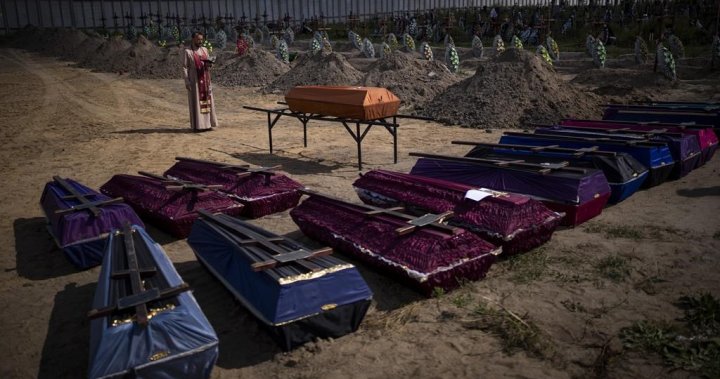
Ukraine says atrocities found as Russian troops retreat could be genocide
Global News
The spokesman for Ukraine's Foreign Affairs Ministry said the findings point to the need for a special tribunal. But Ukraine's allies, including Canada, question the proposal.
As the Ukrainian army liberates territory from Russian occupation, authorities say they are finding evidence of atrocities and crimes against humanity that could amount to genocide.
Oleg Nikolenko, the spokesman for Ukraine’s Foreign Affairs Ministry, said the findings point to the need for a special tribunal. But Ukraine’s allies, including Canada, question the proposal.
Nikolenko called the evidence “horrible” in a recent interview in Kyiv, and he added his voice to the debate that has been going on since the spring over whether Russia’s actions since its February invasion are genocidal.
“Unfortunately, every city that the Ukrainian army liberates, we find there places of mass atrocities, mass graves, torture rooms,” he said. “All those cases are being investigated right now. They are evidence of war crimes, crimes against humanity. And if we take a look overall at Russia’s crimes in Ukraine, it can amount even to a genocide.”
On Sunday, Ukrainian prosecutor general Andriy Kostin told the BBC that Russia’s recent strikes against energy infrastructure were the equivalent of genocide. The attacks plunged 10 million people into darkness, mainly in the capital of Kyiv. The drinking water supply has also failed, sparking fears about the coming winter.
The prosecutor general’s office has catalogued 49,471 war crimes and crimes of aggression that it says have been committed since the Russian invasion began on Feb. 24. Vladimir Putin’s troops at one point occupied up to a quarter of Ukrainian territory, but they had to retreat, and now an estimated 15 per cent of the country is under Russian control, mainly in the east and southeast.
Researchers who have created tools for detecting abuses, in particular by using social networks, reported at a recent conference at the University of Ottawa that crimes and atrocities committed by Russian soldiers increased just before they surrendered territory. In Balakliya, a town that was liberated in September and was recently visited by The Canadian Press, authorities said a torture chamber had been set up in the local police station.
The determination of what constitutes a genocide can stir heated debate. Ukraine long fought to have the Holodomor _ the man-made famine in Soviet Ukraine that killed millions in 1932-33 _ recognized as a genocide, something Canada did in 2008. The UN Genocide Convention defines genocide as acts “committed with intent to destroy, in whole or in part, a national, ethnic, racial or religious group.”













